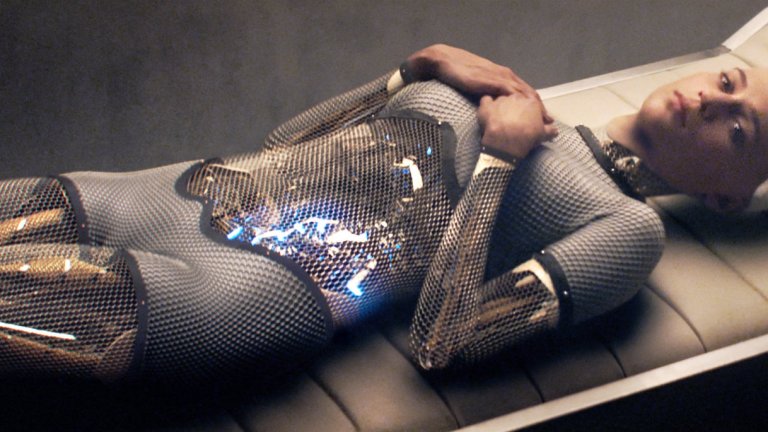Ex Machina Had a Freaky Alternate Ending
Oscar Isaac and Alicia Vikander revealed to us an ending scene removed from Alex Garland's Ex Machina with horrifying ramifications...

This article contains major spoilers for the film Ex Machina.
This past weekend, Alex Garland’s fascinatingly twisted tale of an artificial intelligence, its creator, and the boy caught between them finally enjoyed a wider release. Doing a solid $5.4 million over the weekend, Ex Machina is likely on its way to becoming the subject du jour for anyone who’s dreamed (or dreaded) about the moment of singularity.
Indeed, the ending to Ex Machina is a little bit of both those things since the painfully sympathetic Ava—played with an otherworldly mystique by newcomer Alicia Vikander—at long last gets her wish to be free. She even steals some synthetic skin from obsolete AI models so that she can blend into our world and look oh, so very human…but she’s not. It’s the reason that her mad scientist father (Oscar Isaac) tried to keep her locked up and why he was the first to go at the end of the knife. Next, she left the boy who fell in love with her (Domhnall Gleeson) to an unpleasant fate in an airtight bunker deep underground. But it was all so she could interact with the humans as if she were one of them, right?
Well not exactly. At least, this is not how it was originally supposed to play when Garland delivered his intricate screenplay to his actors, nor how it was filmed. In fact, stars Oscar Isaac and Alicia Vikander talked to me during a roundtable interview earlier this month about an omitted scene that would have brought frightful new context to Ava’s perspective and, implicitly, her motivations.
In the ending currently playing in theaters, Ava leaves Caleb to die and is seen escaping Nathan’s vast compound in a sun dress via a helicopter and its unsuspecting pilot. Their conversation is muted from a distance and we do not see exactly how she convinces him to fly her to the nearest city. However, in the original ending, Vikander and Isaac said there would have been a last minute revelation about Ava’s operating system that would have shifted her character dynamics from earlier in the film.
“It was his line [and] it was a very cool thing,” Vikander said while recalling the scene’s only piece of dialogue. “You saw his face moving, but from her point of view, it was just like pulses and sounds coming out. That’s what she reads.”
Revealing that Ava was never communicating in the way human characters, such as Caleb, perceived they were conversing with her, Vikander’s alternative offers yet another disquieting wrinkle when it comes to viewing the picture. Isaac also elaborated on what he thought it meant and why it was cut.
Isaac said, “So in that scene, what used to happen is you’d see her talking, and you wouldn’t hear, but all of a sudden it would cut to her point of view. And her point of view is completely alien to ours. There’s no actual sound; you’d just see pulses and recognitions, and all sorts of crazy stuff, which conceptually is very interesting. It was that moment where you think, ‘Oh she was lying!’ But maybe not, because even though she still experiences differently, it doesn’t mean that it’s not consciousness. But I think ultimately that maybe it just didn’t work in the cut.”
It may not have worked, but it certainly would be fascinating to see since it provides yet one more reason that Ava’s artificial intelligence is unashamedly (and ever intriguingly) inhuman. She is not trying to be more like us; she is something more and, possibly from Garland’s vantage, something better. Either way, this extra knowledge about Ava’s perceptions will make any future rewatching of Ex Machina that much more tantalizing and challenging.
Ex Machina is in theaters now.
You can follow me on Twitter here.
